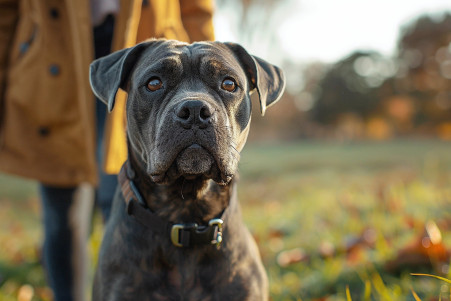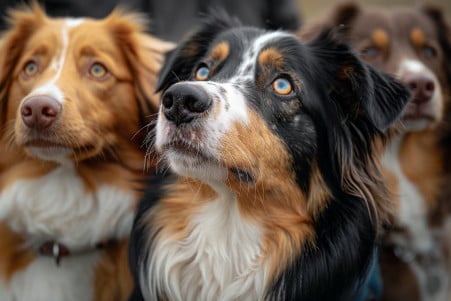Do Dobermans Have Aggression? The Facts vs. The Myths
18 April 2024 • Updated 17 April 2024

Dobermans can be loyal and loving family dogs if they are trained and socialized properly. While Dobermans were originally bred to be guard dogs, which means they have protective instincts, reputable breeders focus on stable, confident temperaments and controlled aggression that is only used when commanded.
In this article, we'll take a deep dive into the most recent studies from animal behaviorists, dog breed historians, and professional dog trainers to separate fact from fiction when it comes to Doberman aggression. This will give you a thorough, research-based understanding of this breed's aggression levels so you can decide if a Doberman is the right dog for you.
Are Dobermans aggressive?
What Causes Aggression in Dobermans?
Genetics and bloodlines can have a big impact on a Doberman's likelihood of being aggressive. As The Doberman Planet explains, the breed was originally created for personal protection, which means that the dogs that were chosen to be bred had certain qualities like strength, courage, and a protective nature. These are all qualities that can lead to aggression if they aren't managed properly.
It's important to make sure that Dobermans are socialized properly from a young age to avoid fear-based aggression. Dog Gone Problems explains that it's important to make sure that dogs are exposed to a wide variety of people, places, and animals during the critical socialization period so that they can build confidence and avoid becoming reactive.
Training can also be a factor. Ask The Dog Guy warns against using "might is right" training methods that rely on punishment, which can lead to confusion, frustration, and defensive aggression in high-drive working breeds like Dobermans. Instead, he recommends positive reinforcement training.
The relationship between the dog and the owner is also important. Dog Gone Problems explains that it's important for owners to make sure that they are providing consistent training that sets boundaries, rules, and leadership for their dogs so that they can build a relationship based on respect and avoid dominance issues. In addition, owners need to make sure that they are getting to the root of the problem when their dog is being aggressive. This means that they need to figure out what is causing the aggression, like fear, anxiety, or frustration, and address that issue instead of just trying to control the dog when it's being aggressive.
Where Doberman Pinschers Came From and How They Were Bred
Doberman Pinschers were developed in the late 19th century by Karl Friedrich Louis Dobermann, a German businessman who needed a loyal guard dog. According to the American Kennel Club, Dobermann created the breed by selectively breeding the smartest and strongest dogs from the local pound. The breeds that Dobermann used to create the Doberman Pinscher are not known, but they likely included the German Shepherd, Rottweiler, and other working breeds.
Dobermann's work was carried on by breeders after his death, and they worked to develop the breed's working ability and appearance. While the breed's history as a guard dog has led to its reputation for aggression, as Doberman Planet points out, breeders have worked to breed out aggression and create a more even-tempered dog.
Potential Health Issues and Life Expectancy
Dobermans are at risk for a number of serious health problems that can affect their life expectancy. The Carson Animal Hospital lists dental disease, infections, obesity, parasites, heart disease, neurological conditions, bleeding disorders, liver problems, diabetes, eye issues, kidney disease, bone and joint problems, thyroid imbalances, and cancer as common health concerns.
Meanwhile, PetHelpful explains that dilated cardiomyopathy, von Willebrand disease, chronic active hepatitis, cervical vertebral instability (Wobbler syndrome), hypothyroidism, bloat, and hip dysplasia are among the most serious health issues that Doberman owners should watch out for. Regular veterinary check-ups and care are important to help manage these health problems.
In spite of these health risks, Dobermans typically live between 10 and 13 years, according to TryFi. However, Doberman Planet explains that an individual Doberman's life expectancy can be affected by genetics, diet, exercise, and responsible breeding. Potential owners should be ready to make sure their dog gets regular check-ups and treatment for any health problems that may come up.
Size and Physical Characteristics
Male Dobermans are typically 26-28 inches tall and weigh 75-100 pounds, while females are a bit smaller at 24-26 inches tall and 60-90 pounds, according to Hill's Pet. The Doberman Pinscher was created in Germany by Louis Dobermann to be a protection dog, which is why the breed has a strong, athletic body and a short, sleek coat, according to Pawlicy Advisor.
These physical characteristics, which also include a powerful jaw and body, are what make the Doberman look so formidable, according to Dimensions.com. Knowing the breed's size and physical characteristics can help people who are thinking about getting a Doberman plan for the space, exercise, and energy needs of these active working dogs.
Training and Socialization to Prevent Aggression in Dobermans
Consistent, positive reinforcement-based training is key to controlling any aggression in Dobermans, according to Dog Gone Problems. Early socialization and exposure to a variety of situations, people, and other animals can help prevent fear-based aggression, according to Ask The Dog Guy.
Structured training that includes setting boundaries, rules, and limitations and providing leadership can help prevent dominance-based aggression and build a better relationship with your dog, according to Dog Gone Problems. It's also important to recognize the signs of reactivity or aggression and intervene before the behavior escalates, according to Doberman Planet.
Owners who are dealing with aggression in their Dobermans can benefit from working with a professional dog trainer or behaviorist. With a focus on positive reinforcement, socialization, and professional intervention, owners can help ensure their Doberman becomes a well-behaved and loving pet.
Conclusion: Responsible Ownership and Debunking Myths
Despite their reputation, Dobermans are not born aggressive. As the Britannica explains, the breed is characterized by its courage, vigilance, loyalty, and intelligence. However, the AKC warns that Dobermans can also be aggressive if they are not socialized and trained properly.
According to the TryFi blog, a Doberman's aggression is determined by a combination of genetic, social, and training factors. Early socialization is important to prevent fear-based aggression. Meanwhile, responsible ownership, which involves setting boundaries and using positive reinforcement training, is key to raising a well-behaved Doberman.
Although Dobermans are often thought of as aggressive, the truth is more complicated. With the right care, these intelligent and loyal dogs can be great family pets. By learning about the breed's true nature and the myths that surround it, people can decide whether a Doberman is the right dog for their family.


